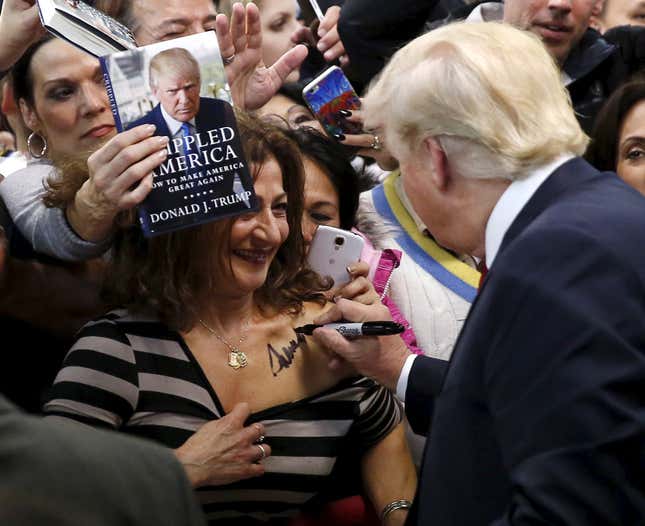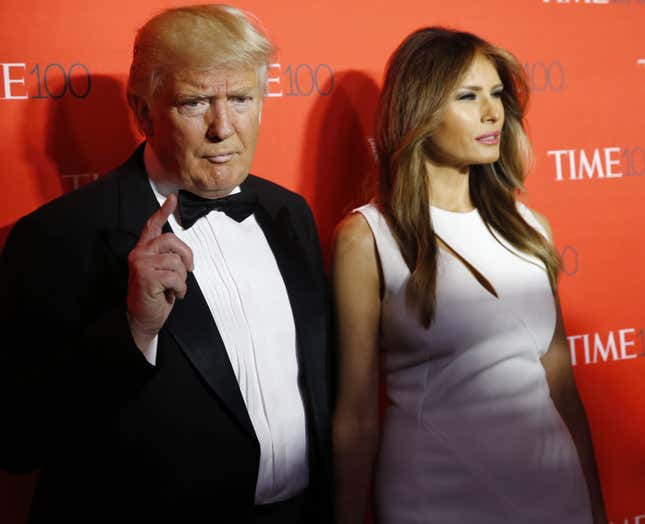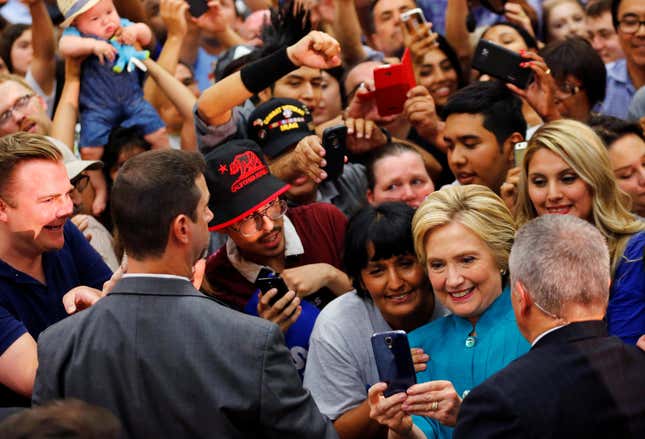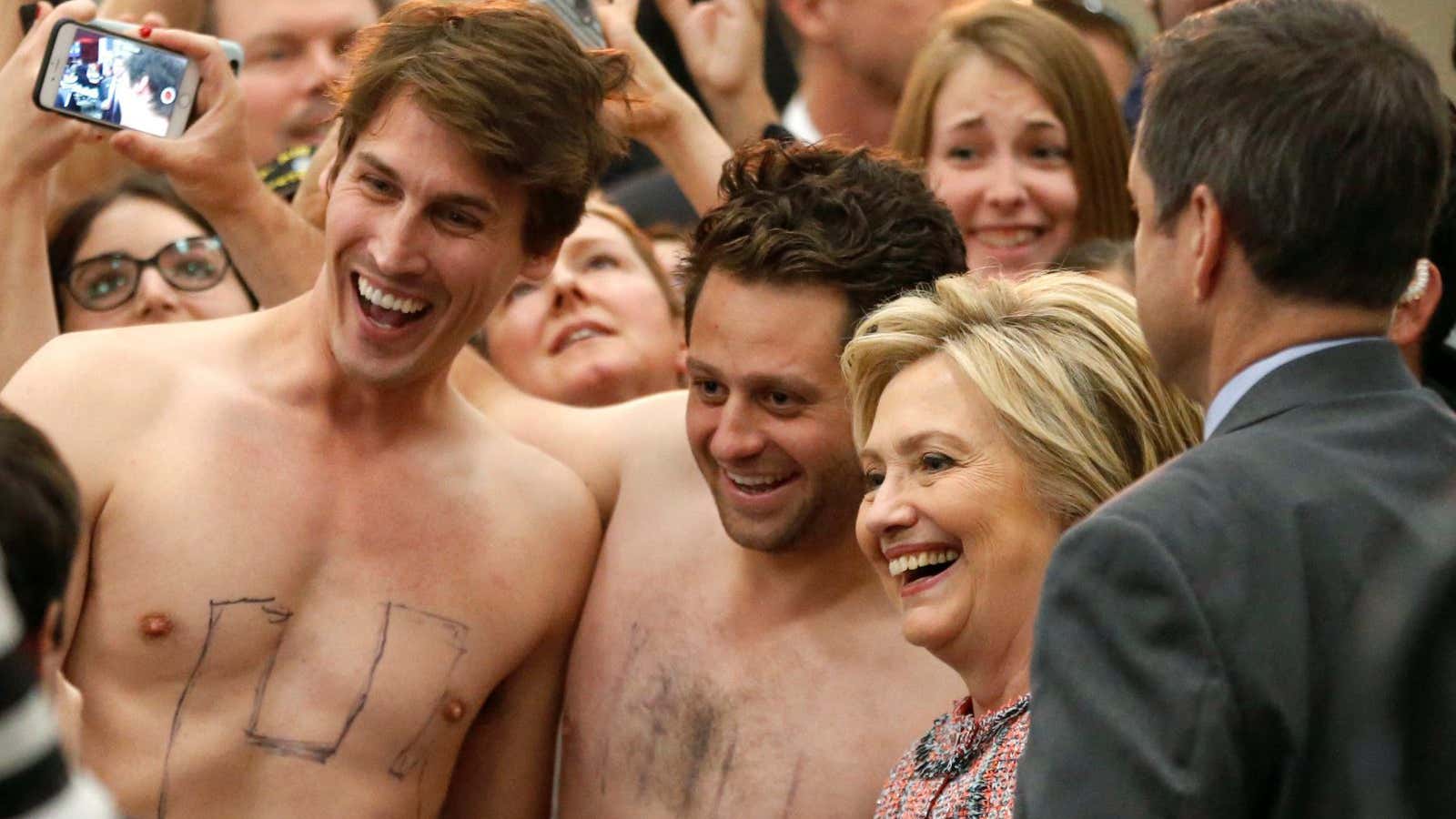Until a century and a half ago, American presidents, not to mention senators, governors, and justices, were a relentless string of sourpusses. There was generally no sense of humor in major politics, mainly because winning and legislating didn’t seem to require one.
Then came Abraham Lincoln, and American politics has never been the same. Lincoln’s comic sensibility—tall tales, swipes at his own looks, long stories with a ribald punchline—put people at ease, made them shake with laughter, and, as a consequence, won them over. He has set the tone ever since. Today, eloquence is a good thing if you want to be president, as is substance. But you have to be able to tell a good joke, too.
Which brings us to Hillary Clinton’s first full-bore assault on Donald Trump, delivered June 2 in San Diego, five days before the pivotal California Democratic primary in which she hopes finally to collect enough delegates to put a stubborn Bernie Sanders away, and pivot completely to the presumptive GOP nominee. According to the New York Times, Clinton delivered a “lacerating rebuke” of Trump. It was an “evisceration,” said CNN, a “blistering attack.” She “slammed” him, said Politico.
Almost no one said the more important thing: Clinton was funny. To her supporters, side-splitting. And that was a relief.

For the last year, Trump has all but owned the public stage. He has consistently attracted massive audiences and grabbed an estimated $2 billion in wall-to-wall free media with his shows of bravado, exaggeration, bluster, threats, stage-whispered racism, sexism, and braggadocio. Some squirmed when Trump mimicked the awkward arm movements of a New York Times investigative reporter suffering from arthrogryposis; noted the Mexican ethnicity of a US-born federal judge in the fraud case against Trump University; and vowed to revive water-boarding by US forces because “torture works.” They gulped as his campaign brought out the most openly bigoted language—against Mexicans, Muslims and Jews—in a national US election since perhaps the anti-Catholic Know-Nothing Movement of the 1850s.
But mostly, the tens of thousands of fans flocking to his events have found his repartee hilarious; after decades of life as a public and private entertainer of sorts, Trump may not be Lincolnesque, but he has undeniable ease with the masses.
That has vexed increasingly worried Democrats, not to mention the much-shrunken core of establishment Republicans still resisting Trump. Especially in recent years, US president Barack Obama has displayed impressive skill as a humorist. But how would the wooden, professorial, and, yes, comparatively unexciting Clinton measure up to the ultra-Lincolnian requirements of the general election? She certainly wasn’t going to stoop to Trump’s level, for example, by joshing him as a frumpy and flabby oldster with a ridiculous comb-over.
Yet absent an appeal to flippancy, Clinton has risked relinquishing a major dimension of modern campaigning to Trump: stagecraft. This has buoyed Trumpian comedians, who mock Clinton’s discomfort.
“Hillary is a humorless cur. Of course she doesn’t stand a chance against Trump,” said Pat Dixon, a Trump-supporting stand-up comedian in Manhattan. “She can’t think on her feet and she resents the fact that something like that is required of her. She suddenly comes off like Jeb Bush’s less charismatic little sister.”
And that is where things stood. Until June 2, when Clinton deadpanned that Trump “says he has foreign-policy experience because he ran the Miss Universe pageant in Russia.” Clinton, it turns out, can be quite a jokester.
But is 2016 a laughing matter?
What has set this election apart—besides that a major party has chosen a hotel-tycoon-cum-reality-TV-celebrity as its nominee—is its sheer volume of below-the-belt vituperation. But, if you look at history, most of the insults actually fall well within the range of acceptable political comedy.
There is precedent, for example, for Marco Rubio’s short flirtation with the size of Trump’s hands, along with Trump’s stout defense of them. In 1799, the political pamphleteer James Callender wrote that John Adams, the second US president, was a “hideous hermaphroditical character which has neither the force and firmness of a man, nor the gentleness and sensibility of a woman.” (The pamphlet got Callender jailed for nine months under the Sedition Act, but not because of the quote; it was for arguing in similarly colorful language that Adams would lead the US into war with France.)
A structural problem with political humor this election cycle, though, is that a lot of people don’t find the discourse—especially Trump’s—to be funny.
It’s a cliché to say we live in extraordinarily polarized times, but we do.To boil down the sentiments to a phrase or two, Republicans believe that Clinton is an incorrigible liar who is on her way to prison; Democrats think Trump is a huckster who could take the US into a race war, if not a nuclear one. Both sides think the other will bring catastrophe to the country—not merely bad policies, but the actual end of the United States.
If there is humor amid such thoughts, Trump seems the likeliest to find it. Most recently, after Clinton’s June 2 speech, he borrowed a moniker he had reserved for former GOP opponent Ted Cruz, threw it into a soup, and dubbed Clinton “Lyin’, Crooked Hillary.” His audience roared.
“A great comedian can be polarizing, and that is an indicator that he is on to something,” said Dixon, the pro-Trump comic. “He is not pretending to be somebody he isn’t, and that is what is a good comedian. He has the gift of seeming pre-eminent—the funniest guy in the room.”
Trump does have the gift of dominating crowded spaces. That’s what helped him vanquish his 16 Republican rivals; it is also why much of the Republican establishment is, if begrudgingly, embracing him. In pure terms of pizzazz and shaking up the game board, Trump indeed may be the best the Republicans could have done this year.

In an interview with Politico, Tim O’Brien, a Trump biographer, suggested that when audiences are lapping up Trump—or, in the case of probably half the country, not lapping him up—they are not so much watching a potential president, but a well-practiced Trumpian depiction of a cinema tough-guy. With his scrunched-up face, narrowed eyes, and puckered lips, Trump reminds O’Brien specifically of the unnamed Clint Eastwood character in High Plains Drifter. (Trump’s wife, Melania, appears to have picked up the eyes thing as well, O’Brien noted.)
There does seem to be something to the comparison. Only, Eastwood isn’t usually thought of as a humorist, and Trump is no drifter. But as long as we are contemplating Hollywood roots for the Trump phenomenon, perhaps it’s more instructive to think of him as The Music Man, a guiltily entertaining badboy, spreading fear, but promising a bright future—if only everyone will follow him.
The question for Clinton, then, is how to respond to an unorthodox rival who, like a film character, morphs from one scene to the next? ”How to handle Trump is a conundrum. It’s a Trump-22,” said Jeff Nussbaum, a pro-Democrat humorist and speechwriter in Washington.
Brian Agler, a political comic in Washington and a partner of Nussbaum’s in a speechwriting firm called West Wing Writers, is certain the answer involves humor. ”That’s the best way to show how absurd this is and cut him down to size, especially when he is so big and braggadocious,” Agler said. “If you make a straight-up policy argument, it doesn’t work.”
The risk of trying to make fun of Trump
Clinton is a whip-smart politician who articulates the country’s and the world’s complexities with a breadth few in American public life can match. But she also ranks high for plodding oratory; Clinton has simply amassed no record for Obama’s improvised witticism, her own husband’s magnetism, or any other tricks of stagecraft that can lighten an audience’s mood. And unfortunately for Clinton, wonky policy competence alone won’t bring around the two constituencies requiring persuasion—independents and Sanders fanatics.

But even if she did possess an aptitude for comedy, how would she wield it in this case, when all attempts by Trump’s other rivals to date have fallen flat?
Alison Dagnes, a political science professor at Shippensburg University in Pennsylvania, teaches courses on American political behavior. She says that, comically speaking, a prime problem for a would-be jokester is Trump’s fan base, which to a large degree is people who feel deeply, personally aggrieved.
When Trump lashes out at perceived wrongs—the impact of illegal immigration, the loss of jobs, the demise of coal, the financial cost of foreign entanglements—his followers feel affronted right along with him, and generally believe that he, and only he, will set things right. It’s an absurd conclusion; neither Trump nor anyone else is, for example, going to restore masses of coal or manufacturing jobs, lost to the economics of natural gas and cheap labor abroad. But his rivals have gotten nowhere by pointing this out, Dagnes says. In fact, they have simply antagonized Trump followers. This is because, by ridiculing Trump’s ideas, by extension his rivals are mocking Trump’s followers.
“For something to be funny, you have to punch up,” Dagnes says. “The people who like Trump—with them, you are not making fun of a politician, but of a whole group of people, and you are punching down, and look like a bully. You can’t call people voting for Trump an idiot.”
Live from New York…
And yet Saturday Night Live, America’s go-to political comedy show now that Jon Stewart has retired from The Daily Show, is joking about Trump–in recent months, it has flouted convention and paved the way for “punching down” anyway. Its comics, while eagerly inviting Trump onto the show, have also unapologetically suggested that he and his supporters are completely loopy.
Clinton, who has also appeared on SNL, may have learned from this aspect of the show as she readied her June 2 trial run as a political humorist. If you boil down her 40-minute speech, she was calling Trump silly and out of his depth. “I will leave it to the psychiatrists to explain his attraction to tyrants,” she said in one thrust. In another: “It’s clear he doesn’t have a clue what he’s talking about.” In yet a third: “Being interviewed on the same episode of 60 Minutes as Putin was is not the same thing as actually dealing with Putin.” This was good, biting stuff.
To get there, the New York Times reports, her staff spent weeks reviewing attacks by Trump’s GOP rivals over the course of the primary season; they were in search of what hadn’t worked against him. From there, Clinton speechwriters produced a five-star selection of rhetorical wallops, really a bare-knuckled political sketch, which she delivered in her natural style—flat but earnest, an approach that packed a punch precisely because no one had ever heard her speak that way, at least publicly.
“He also says, ‘I know more about ISIS than the generals do. Believe me.’ You know what? I don’t believe him,” Clinton said.
A Reuters/Ipsos poll of likely voters conducted May 30 through June 3, thus including at least a day of calls after the speech, showed Clinton clawing her way well ahead of Trump. Clinton had the support of about 46% of those surveyed, and Trump 35%; a month ago, the same poll had them tied.
There is no national poll as yet conducted only after the speech. But there is also no point in extrapolating these figures as far as November. Trump, too, has shown himself to be rhetorically agile, tough, and above all surprising. He certainly won’t stand still, but Clinton now intends to cut him down with her new, light touch.
